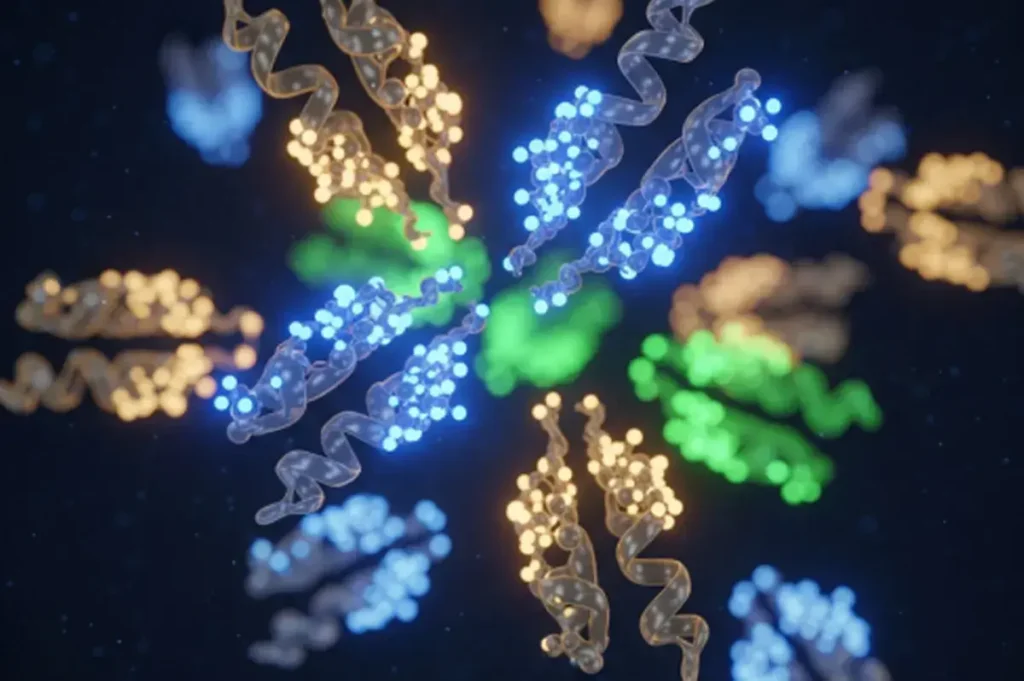Cells are the basic building blocks of the human body. Everything we see and everything our organs do begins at the cellular level. Cells produce energy, repair tissues, fight infections, send signals, and keep every system working smoothly.
They work in a highly organized way, following instructions stored in their DNA.
In a healthy body, cells grow, divide, and die in a controlled manner. They communicate with each other through signaling pathways to maintain balance and ensure that every organ works at the right time and in the right way.
However, when normal cells stop working properly and ignore signals, they start to grow uncontrollably. This leads to tumor growth. These changes in cell behavior disrupt the signaling pathways. So, scientists need to understand what went wrong inside the cell. Here is where phospho antibodies come into play.
What are Phospho Antibodies?
Proteins inside cells often get activated or deactivated through a process called phosphorylation. Phosphorylation happens when a phosphate group attaches to a specific amino acid in a protein—usually serine, threonine, or tyrosine.
This small chemical change can:
- Turn a protein “on” or “off”
- Change the protein’s shape
- Control where the protein goes inside the cell
- Affect how the protein interacts with other molecules
A phospho antibody is an antibody designed to recognize a protein only when it is phosphorylated at a specific site. This makes phospho antibodies powerful tools for tracking active signaling pathways. This further helps scientists study how signals change, which proteins are affected, and how these changes in cells lead to cancer.
However, not all phospho antibodies are reliable. Some may bind to:
- Non-phosphorylated forms of the protein
- Wrong phosphorylation sites
- Different proteins altogether
As a result, researchers may misinterpret results. So, proper validation of a phospho antibody is crucial. It ensures the antibody detects exactly what it is supposed to detect.
Benefits of Phospho Antibody Validation
Ensure Specificity to the Phosphorylation
Site Validation is the process of confirming that a phospho antibody binds only to the correct phospho-site. However, cancer signaling pathways often involve many similar proteins. So, they can bind to multiple phosphorylation sites.
However, a validated phospho antibody shows:
- Strong binding to the phosphorylated form
- No binding to the non-phosphorylated form
- No cross-reactivity with unrelated proteins
As a result, the researchers can ensure the antibody binds specifically to the phosphorylation site and always gives accurate signals.
Confirm Sensitivity to Detect Small Changes
Cancer signaling often changes rapidly. Protein phosphorylation levels can rise or fall within minutes. However, a validated phospho antibody is sensitive enough to detect even small changes in phosphorylation.
As a result, scientists can easily identify:
- Drug responses
- Early activation signals
- Time-dependent changes in signaling
A validated phospho antibody ensures that not even a single biological event is missed.
Avoid False Results in Complex Cancer Samples
Tumor samples are complex. They contain many cell types, high levels of background proteins, and variable protein expression. A phospho antibody that works well in purified samples might fail in real tumor tissues.
However, validation tests show that the antibody performs reliably in various techniques, such as western blot, immunohistochemistry (IHC), immunofluorescence, flow cytometry, etc.
This ensures the antibody can handle the complexity of cancer samples.
Improve Accuracy in Drug Development Studies
Targeted cancer therapies often work by blocking specific signaling pathways. For example:
- EGFR inhibitors block phosphorylation of EGFR
- PI3K inhibitors reduce phosphorylation of Akt
- MEK inhibitors affect ERK phosphorylation
Researchers rely on phospho antibodies to measure whether the drug is working. If the antibody is not validated, the drug may look effective (or ineffective) when it is not. So, proper validation helps drug developers measure the true effect of new cancer treatments.
The Bottom Line
Phospho antibodies help study how cancer disrupts cellular signaling. However, the accuracy of results depends on their validation. With proper validation, results can be misleading. So, make sure you use proper validated phospho antibodies to ensure you get accurate and reproducible results!





